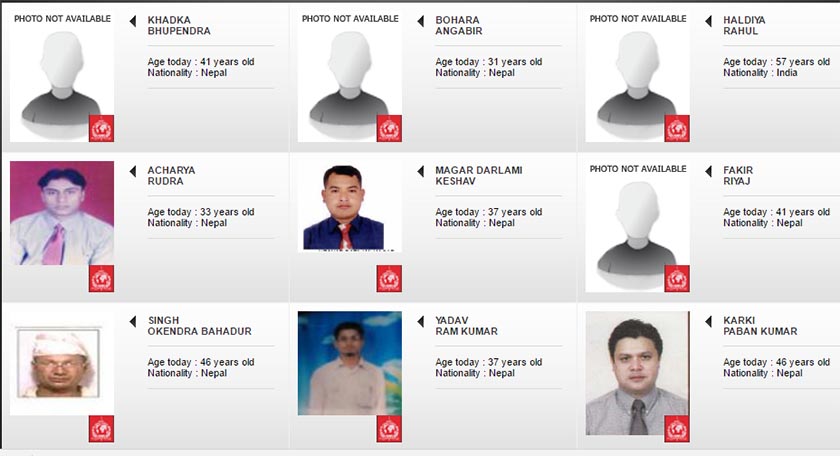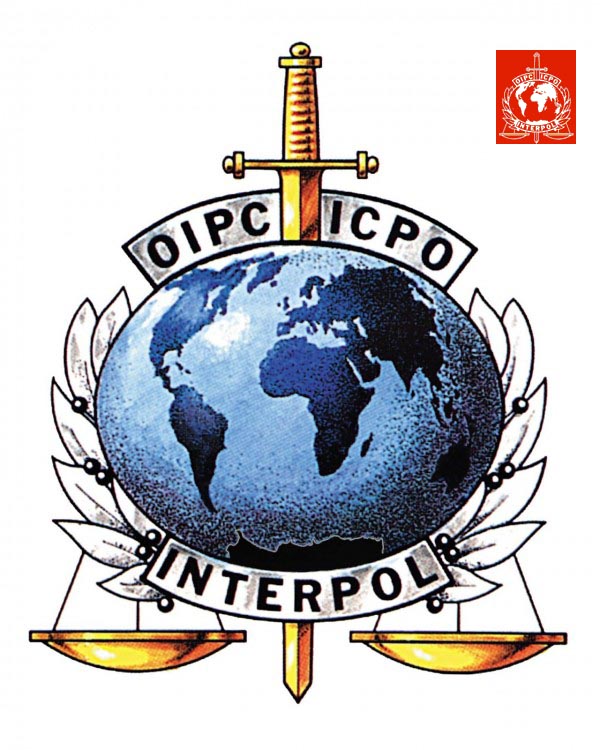INTERPOL Red Corner Notice against 14 Nepalis

Kathmandu, January 31
International Criminal Police Organisation has issued Red Corner Notice against 16 persons, including 14 Nepali citizens, on the request of National Central Bureau, Kathmandu.
NCB, a division of the concerned national police agency, serves as a contact point for the INTERPOL in 190 member countries, enabling them to work together on cross-border crime investigations and exchange information related to criminals and suspects.
Of the Nepalis on the Red Corner Notice list, six face murder charge, four foreign employment fraud, two banking offences, one abduction and extortion, and one rape. They include Rudra Acharya, 33, of Ratnanagar Municipality-8, Chitwan for his involvement in kidnapping Krishna Prasad Adhikari of Phujel-7 Gorkha.
Krishna Prasad, youngest son of Nanda Prasad Adhikari and Ganga Maya was shot dead in Bakulahar Chowk of Chitwan on May 6, 2004, said NCB Kathmandu. Acharya is said to be hiding in the United Kingdom.
Similarly, two foreign citizens are Ian Baker of USA and Rahul Haldiya of India. Baker was found selling wild animals’ skin, head, bone and others in Nepal. Haldiya defrauded Dabur Nepal PVT Ltd of Rs 30.65 million on the pretext of selling its products in the Indian market through his company, informed NCB Kathmandu.
The Interpol circulates Red Corner Notices for the purpose of arrest and subsequent deportation of criminals and suspects on the recommendation of member countries upon verification of their details. The notice is issued against any person convicted by the court. For this, the court of the concerned country is required to issue arrest warrant against the guilty for his/her arrest for extradition.
Meanwhile, Nepal Police has managed to arrest 12 convicts through issuance of INTERPOL’s Red Corner Notice over a period of two years. They include Sanjay Ismali, a murderer of Justice Rana Bahadur Bam; Jagadish Chand, a murderer of Jamim Shah; and Raj Kumar Praja, a notorious rhino poacher.
AIGP Bigyan Raj Sharma said INTERPOL facilitates cross-border police co-operation and supports and assists all organisations, authorities and services whose mission is to prevent or combat international crime, among others. Nepal was nominated 100th member of the INTERPOL by the 36th General Assembly Session held in Kyoto, Japan on September 27, 1967.
The NCB Kathmandu was established then to liaise with various departments in the country, with those bodies in other countries serving as NCB, as well as with the organisation’s General Secretariat.
READ ALSO:
- Dahal thanks INTERPOL for support to Nepal Police
- INTERPOL meet stresses regional cooperation to combat crime
- What is the purpose of an INTERPOL Red Notice?
A Red Notice is a request to locate and provisionally arrest an individual pending extradition. It is issued by the General Secretariat at the request of a member country or an international tribunal based on a valid national arrest warrant. It is not an international arrest warrant.
INTERPOL cannot compel any member country to arrest an individual who is the subject of a Red Notice. Each member country decides for itself what legal value to give a Red Notice within their borders.
- Are the individuals wanted by INTERPOL?
No, they are wanted by a country or an international tribunal. When INTERPOL publishes a Red Notice this is simply to inform all member countries that the person is wanted based on an arrest warrant or equivalent judicial decision issued by a country or an international tribunal. INTERPOL does not issue arrest warrants.
- Who are the subjects of Red Notices?
Red Notices are issued for individuals sought for prosecution or to serve a sentence. When the individual is sought for prosecution it means they are suspected of committing a crime but have not yet been prosecuted and so should be considered innocent until proven guilty.
- How is a Red Notice issued?
Police in one of our member countries request a Red Notice via their National Central Bureau and provide information on the case.
The INTERPOL General Secretariat publishes the Notice after a compliance check is completed.
Police all around the world are alerted.
- Why is the Red Notice important?
It gives high, international visibility to cases
Criminals and suspects are flagged to border officials, making travel difficult
Countries can request and share critical information linked to an investigation.
- Can I look up a Red Notice?
While most Red Notices are restricted to law enforcement use only, some member countries choose to make an extract publicly available. This includes information such as the individual’s name and the criminal charges for which they are wanted. The full Red Notice contains additional information for law enforcement purposes only. See public extracts of Red Notices.
- What should I do if I have information on an individual?
Please inform your local police authorities and/or the INTERPOL General Secretariat.
- What can I do if I am featured in the “wanted persons” section and I would like to seek more information or ask for the Notice to be removed?
You can contact the Commission for the Control of INTERPOL’s Files (CCF), which is an independent monitoring body. Applications to the CCF are free of charge and treated confidentially.
Source: INTERPOL






